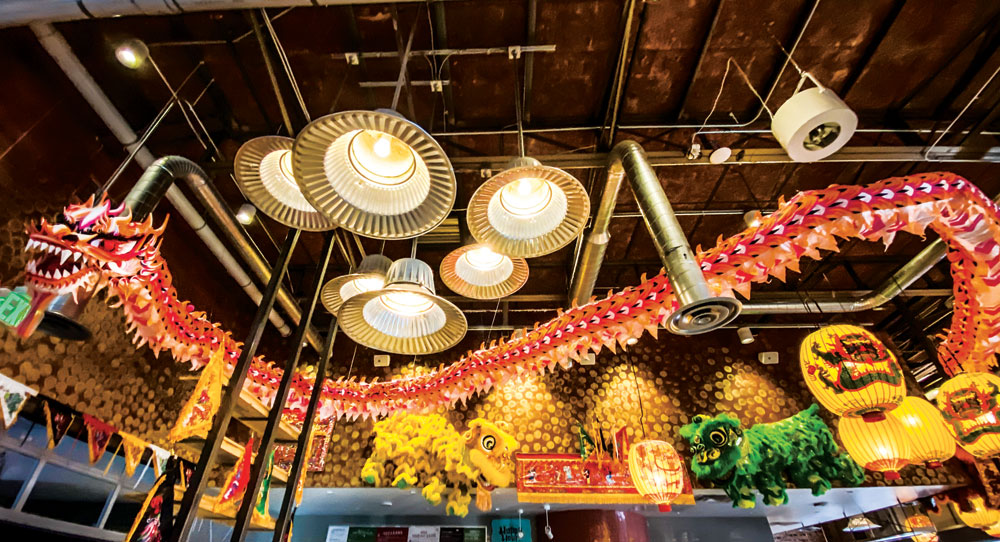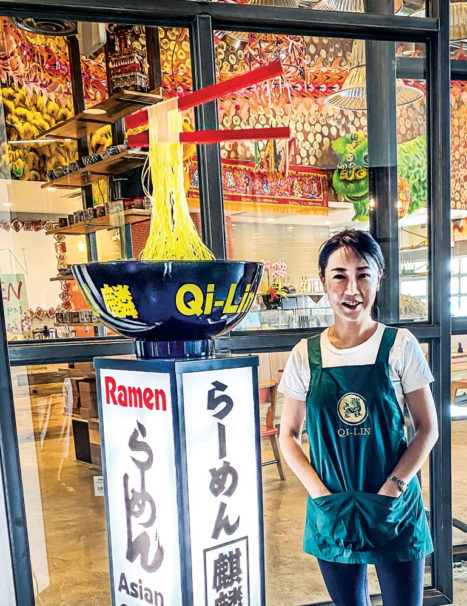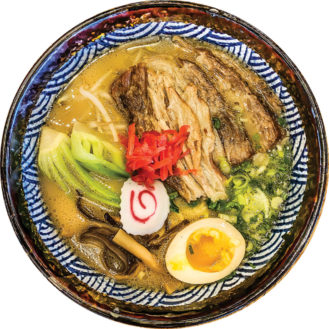
Interior of Qi-Lin restaurant in the Stanley Marketplace.

Charlene Thai’s new Qi-Lin restaurant at Stanley is visible behind her.
Photo by Christie Gosch
The mechanical sign outside, with chopsticks pulling noodles from a bowl, gives people the first indication of what they’ll find at Qi-Lin: Ramen. The fake fried rice captured mid-toss from a wok hints at the Chinese food offered there. And the suspended, serpentine Lion Dance figure is further clue that diners are in for an immersive culinary experience. “It’s hard for people to travel internationally now, so when they come to our place and see all the decorations, it brings them closer to Asian culture,” says Charlene Thai, who, along with her husband Robert, own Qi-Lin and sushi restaurant, Misaki, both at Stanley Marketplace.
The restaurant’s name, pronounced “chi lin,” refers to a mythical creature with a horselike body and dragon head that represents business prosperity. Open since late July, the concept was inspired by numerous requests for ramen at Misaki. While there wasn’t much competition in the area for ramen, there was plenty for Chinese food, so the couple wanted to offer something different. Nearly 40% of the guests at Misaki ask about gluten-free options, so the Thais knew there was a big market. After a lot of research to source ingredients, 70% of Qi-Lin’s Chinese dishes are gluten-free, including Kung Pao Chicken and Mongolian Beef. The ramen bowls are not.
One remnant of the previous tenants, Sazza pizzeria, is the large pizza oven. Although Chinese cooking is rarely done in the oven, Qi-Lin uses it to make marinated pork belly for one of their ramen dishes, cooking it for four hours until it’s very tender. “That connects us back to Sazza, a place our team loved,” says Charlene. They might prepare duck and other dishes in the oven too, in the future.

Tonkotsu Ramen
The restaurant’s core dish, ramen, is traditional to Asian cultures. The type of broth and shape of noodles vary depending on the geographic region. Qi-Lin serves a more southern style of Japanese ramen with a pork base but also offers a vegetarian mushroom-base option.
In Japan, etiquette calls for not cutting the noodles, slurping loudly as you eat them with chopsticks and a special spoon, followed by drinking the broth, all to show respect and gratitude to the chef. “If you haven’t been to Japan, it’s hard to make people understand,” says Charlene. “Our customers are so well-mannered, we should put up a sign saying ‘It’s okay to slurp!’”
Visit https://www.misakidenver.com/ for information or call 720-288-0011


0 Comments